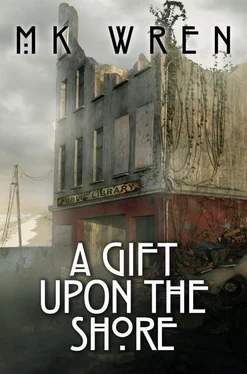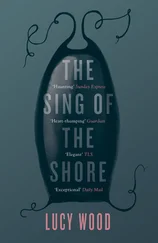I unfold it carefully. “It begins, ‘My dear Mary… I waited too long to find my courage. Now I can’t come to you, I can’t speak to you face-to-face, because there’s so little time left for me in this world. I am sending this letter with my son Jeremiah. He is my only son still living. I told him to find you, because I know how much he can learn from you. You were good and true, and I was blind to the truth, but the scales have fallen from my eyes, and I know I betrayed you and Rachel. I’ve known it for many years. Finally, before I die, I must tell you. I pray the Lord to give me the strength to finish this.’”
I hear a muffled sound, look up to see Jerry’s lips compressed, grief straining at his taut self-control. I turn the first page over.
“‘Mary, I wanted to go to Amarna many times, but never had the courage to face you. I think of you, and you are in my prayers every day. I see you as you were when we first met. In my mind you’ve never gotten old like I have. I see Rachel, too, and hope she lived in spite of her injury. When I count the years, I know she can’t be living still, but I hope she died in peace. I wonder about our child….’” And I hesitate, refusing to look at Jerry, but aware of his gaze on me. “‘A child conceived in love, and I know it sustained him. Tell him his father was a foolish man, but he loved his mother.’” I slide the sheet under the last one, swallowing against the tightness in my throat. I think Luke stopped there, too. The writing changes, becomes more erratic.
“‘That last day—I’ll never forget it. You said if the Ark was our only hope, we had no hope. You spoke the truth like a prophetess. The Doctor kept saying Rachel was a witch, and I saw then that the Lord’s grace had left him. She was a good woman, a woman of wisdom. But I didn’t stand against him. He sinned by his lies, and I sinned by my silence. The night after you and Rachel left, he had a stroke. Some thought it was a judgment. Others said it was a witch’s curse. I had to take over as preacher for a while.’”
I turn the second, dryly rustling sheet, glance up at Jerry. His face is expressionless now, but the muscles of his arms flex intermittently. I study the page, read, “‘it was a bad time for us, but we came through it finally. The Doctor got over his stroke, except his left hand and leg were never strong again, and it was like all the power had gone out of him. Sometimes you could still feel the strength and love in him, but other times he was hard to be with. And sometimes he just couldn’t manage like he used to, and the Elders had to step in. But those were still good years. There were more babies. Mary, I had four children once, and three grandchildren.’”
I put the second sheet behind the others, and I’m sure there’s been another lapse of time. The writing is getting difficult to read, the spelling degenerating.
“‘Night again. Bernadette wants to take my paper and pen away. Doesn’t understand. Have to finish this. Brother Adam died today. He never believed you were evil. I was telling about the good years. Sixteen years, my sweet Mary, good crops and good years. But God sent a storm one night. Lightning hit the church, went down the steeple. You said we should have a lightning rod on that steeple, out in the open like it was, tallest thing around. A prophetess, yes. The church burned. Doctor was asleep in his room.’” I turn the page over, remember the first time I read these words. “‘He got burned so bad you couldn’t recognize him, but it wasn’t till the next day that he passed on.’”
And I remember I felt at that moment a resurgence of the old desire for revenge, and it seemed at first satisfied by the Doctor’s painful death. I hoped that during the long hours he survived with burns so severe he was unrecognizable, he thought just once of Rachel, of the anguish she suffered, and finally understood what he had done. But I knew he did not. His death, even in agony, changed nothing.
Jerry says, “Please, Mary… go on.”
I focus again on the page. There’s been another time lapse; I can barely decipher the words. “‘Sun’s up. Been sleeping like Bernadette says. She’ll come down with fever, too. Has to rest. After the Doctor’s passing, we built a new church. Miss the bell. Half-melted, never rang true. We had two peaceful years. Seventy-eight souls here Christmas. Five came from near Eureka last October. Told you I saw smoke there. Good Christian people. Said there was fever where they came from, but they never had it. Maybe they brought this fever. Maybe God sent it. Only thirty-seven left.’” I look up at Jerry, see his eyes unfocused, haunted. He remembers.
He says dully, “Brother Luke called it a judgment. Those were nearly his last words.”
I don’t try to answer that, but turn to the next page. “‘I told the Flock to leave the Ark before they all died. Start new someplace else. No hope left at the Ark. Getting hard to write. Told Jeremiah how to find you. Others going south. Told him to redeem me to you. Teach him what I never could. And his children. Mary, forgive me. Pray for me.’” My voice has become as erratic as Luke’s writing, and I clear my throat before I add, “It’s signed simply ‘Luke.’”
Jerry is looking south into the wind. At length, he says huskily, “My father was a good Elder, a good shepherd to the Flock, but it seemed like nothing he did helped when so much grief came down on us. I don’t understand it, why we had to suffer so much at the Ark.”
“Jeremiah, the Ark was a great success.”
His head comes around abruptly. “It’s deserted—dead! How can you call it a success?”
“You didn’t live through the years right after the End. Rachel and I searched for survivors and found nothing but death and desolation. Luke found only a few survivors and even more desolation. Yet at the Ark people lived. You’re the second generation, and your children are the third. That two more generations came out of the Ark is a miracle.”
His face is as transparent in its revelation of emotions as Luke’s was. I watch him run the gamut from grief to skepticism to amazement. He says softly, “Maybe we were driven out of the Ark for a purpose.”
“Maybe. But purpose is a human invention. We need purpose, but we impose it on ourselves.”
He ponders that, but makes no comment on it. He says, almost formally, “Thank you for reading the letter to me.”
And I wonder if he regrets as much as I do that I didn’t read it to him sooner. “Jerry, I keep it in a drawer in my room. When I die, I want you to find it. It will be yours then.”
He nods. “I’ll take good care of it.” He seems to want to say or ask more, but when he speaks, it’s only to say, “I have to get out to the north pasture.” He glances at Stephen, as if he’s forgotten why the boy is here, then departs without another word. I watch him until he disappears beyond the corner of the house.
Luke, at least you gave your son something to think about—if he’s willing to face it .
I fold the letter and slip it into my skirt pocket, then look at Stephen. He stares at my hands as if they still held the letter, a muscle tensing spasmodically in his jaw. I say, “Stephen, the story is ended now. There’s no more I can tell you.”
“Isn’t there?”
That question is so curt, so coldly adult, I am for a moment shocked and even angry. Stephen seems to realize, too late, the cold charge in his words. He turns away, holding himself rigid.
And I chide myself for my anger. I don’t know what’s preying on his mind, but it’s serious, and I must understand it. I study his profile, the tight, sculpted contours of his full lips, and I wait for him to speak, but he seems willing to outwait me. At length, I ask, “You don’t think the story is finished?”
Читать дальше












